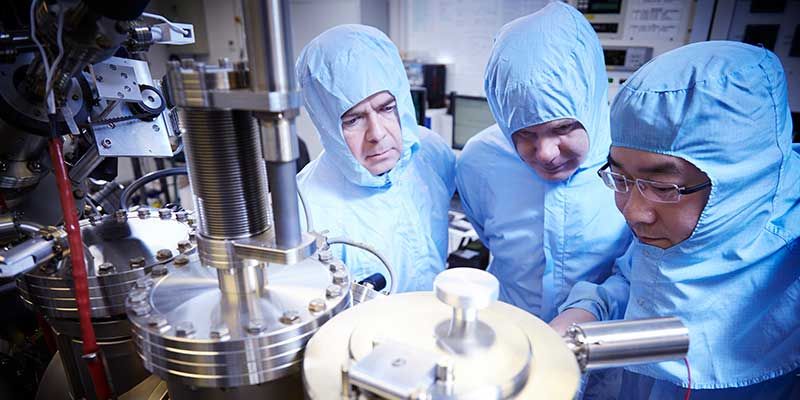The Henry Royce Institute

The University of Leeds is a founding partner in the Sir Henry Royce Institute for Advanced Materials.
The Institute aims to be a world-leading centre for advanced materials research and commercialisation and the Institute's work at Leeds is based at the Bragg Centre.
The Royce, a £235m government investment led by the University of Manchester, brings together internationally-renowned academics from across the UK, provides funding and access to equipment and facilities, and works closely with industry to enable the commercialisation of fundamental research. The Institute’s remit is to support the UK manufacturing base and reduce the time to take new materials from invention to market.
The Institute has provided funding for some of our facilities and equipment at Leeds.
Atoms to Devices
Leeds is joint lead for Atoms to Devices – one of the Institute’s research themes. Professor Edmund Linfield (Leeds) and Professor Neil Alford (Imperial College London) are Academic Champions.
The Atoms to Devices research programme will focus on translating new material systems from the atomic scale to operational devices.
The project builds on an existing world-leading UK academic research network. It provides a unique suite of specialised laboratory facilities for the design, fabrication, characterisation and integration of materials into device architectures.
Atoms to Devices will address a number of significant challenges based on the design and realisation of new functional materials with demonstrable economic and societal impact.
For example, what if we could develop new means of heat recovery with solid state materials such as thermoelectrics? We would see a fuel economy improvement of 3 to 5%, leading to a UK saving in excess of £15 billion a year. And, what would happen if we could make electric circuits that convey information but do not generate heat?
Research themes
Atoms to Devices is made up of the following themes:
- Theory and simulation
- Manufacture of powders
- Thick and thin films
- Control of interfacial properties
- Structural, chemical and electrical characterisation
- Patterning and lithography
- Device testing
Ongoing research at Leeds in atoms to devices attracts funding from government, the EU and industry sponsors. Our future research in this area will be enhanced by our association with Royce and access to the new facilities.
Projects include:
HyperTerahertz: high precision terahertz spectroscopy and microscopy
This Engineering and Physical Science Research Council (EPSRC) funded programme will create the first comprehensive instrumentation for precise Terahertz (THz) frequency spectroscopy, microscopy, and coherent control. This will be based upon Leeds’ unique and proprietary capabilities to generate, and manipulate photonically, THz signals of unprecedentedly narrow linewidth and with sub-wavelength spatial resolution.
The instrumentation will then be exploited to create new challenge-led applications in non-destructive testing and spectroscopic analysis for electronics and atmospheric sensing, inter alia, as well as discovery-led opportunities within physics, quantum technologies, materials science, atmospheric chemistry and astronomy.
- EPSRC Programme Grant (EP/P021859/1), £6.5 million, 2017 to 2022
- Principle Investigator: Prof. A G Davies, Co-Investigators: Prof. E H Linfield, Prof J Cunningham, Dr J R Freeman, Dr P Dean
EPSRC National Facility for Advanced Electron Microscopy
The National Facility is run by a consortium of six universities (Leeds, Liverpool, Glasgow, Oxford, Manchester and York) and is led by Professor Quentin Ramasse (Facility Director at Daresbury and seconded from Leeds) and Professor Rik Brydson of Leeds and Consortium Chair.
It is based around the SuperSTEM facility at STFC Daresbury Laboratories in Cheshire, founded by EPSRC in 2001, but also provides access to complementary advanced instrumentation at Consortium University sites.
- EPSRC Equipment Account (EP/J021156/1; Principle Investigator: Prof D. Hogg), £5.6 million, and EPSRC Contracts 2012-2022
Royal Academy of Engineering (RAEng) Bragg Centenary Chair
Professor Sven Schroeder was appointed to Bragg Centenary Chair.
- RAEng/Diamond/Infineum UK Ltd, £1 million, 2015-2020
- Principle Investigator: S L M Schroeder
Spintronics at Leeds
The Condensed Matter group in Leeds is well known for its work on spintronics – a subject defined by the exploitation of the magnetic moment of electrons instead of charge. The group is one of the first to develop high frequency equipment for molecular spintronics in order to research eco-friendly microwave devices and are also exploring ways of switching magnetisation using the strain developed by an electric field – important for future storage applications.
Building on Leeds’ recognised strengths of thin film growth, characterisation and magnetotransport the platform grant is funding a programme of engineering materials in combinations that yield fruitful emergent properties to address strategic areas such as quantum effects for new technology, beyond complementary metal-oxide-semiconductor (CMOS) electronics, energy efficient electronics and new tools for healthcare.
- EPSRC Platform Grant (EP/M000923/1), £1.47 million, 2014-2019
- Principle Investigator: Prof. B J Hickey, Co-Investigators: Dr T Moore, Dr O Cespedes, Dr G Burnell
EU Marie Curie Innovative Training Network (ITN) in Nanoscale Magnetic Structures (WALL)
WALL is a training network on the topic of domain walls in nanoscale magnetic structures, which will provide the next generation of researchers in this area of advanced technology. Domain walls (DWs) are the interfaces separating magnetic domains. Their high speed manipulation in nanostructures will lead to the next generation of new and low power functional devices for computation and communication.
- EU Marie Curie ITN (608031), €2.7 million, 2013-2017
- Leeds Co-Investigator: Prof. C Marrows, Dr T A Moore
For more information about the Atoms to Devices theme please contact Professor Edmund Lindfield at the email address Email Professor Edmund Linfield at E.H.Linfield@leeds.ac.uk or follow the Royce Institute on X.